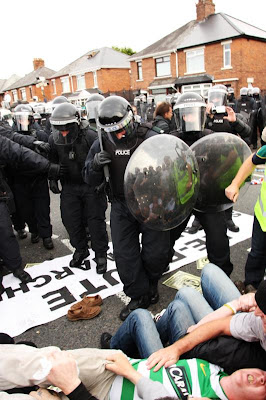Fianna Fáil Should Apologise
29/08/2010
Donegal spokesperson for the socialist political party éirígí, Micheál Cholm Mac Giolla Easbuig has called for an apology from MEP Pat the Cope Gallagher and his party Fianna Fáil for what he says was a string of lies fed to the electorate regarding the Lisbon referendum.

His comments come following the announcement last week of further job cuts in the county at the Oatfield sweet factory in Letterkenny. There are plans to axe 30 jobs from the factory leaving only 15 people employed in the well known establishment which has been a familiar fixture in the Donegal town for many years. The job losses come as the company Zed Candy, who now own the Oatfield brand and the factory, plans to move manufacture of certain lines of sweets from Letterkenny to a factory in the UK.
Speaking following the announcement Mr Mac Giolla Easbuig said, “This is just another case of job losses in this county which exposes the Fianna Fáil led government for the liars that they are. Here we have a company who now own a business which has been in Letterkenny for 80 years, shedding jobs solely in the interests of the owners and its all going on under the watchful eye of the government in Lenister House.”
 “Thats 30 job losses announced last week and 100 announced the week before in Buncrana and no doubt there will be a knock on effect of further unemployment because of these losses. So one has to ask where is the economic security and jobs promised by those who campaigned for a YES vote in the Lisbon referendum. This time last year we had the government out disgracefully forcing people back to the polling booths to vote again on the Lisbon Treaty, a treaty which the people of the Twenty-Six Counties had already rejected. But because those in Lenister House and their masters in Europe didn't like what the people had said, they rejected their democratic vote and forced them back to the polls,” he said.
“Thats 30 job losses announced last week and 100 announced the week before in Buncrana and no doubt there will be a knock on effect of further unemployment because of these losses. So one has to ask where is the economic security and jobs promised by those who campaigned for a YES vote in the Lisbon referendum. This time last year we had the government out disgracefully forcing people back to the polling booths to vote again on the Lisbon Treaty, a treaty which the people of the Twenty-Six Counties had already rejected. But because those in Lenister House and their masters in Europe didn't like what the people had said, they rejected their democratic vote and forced them back to the polls,” he said.Calling for a public apology, the éirígí spokesperson finished by saying, “Those who led the charge for a YES vote in the re-run of the Lisbon referendum fed the electorate a string of lies when they said that voting yes would solve the problems in our economy and create jobs. MEP Pat The Cope Gallagher himself when talking in reference to Lisbon insinuated that voting Yes would “ensure that we can create more jobs”. But instead we see story after story in the press of more jobs losses. At the end of July 2009 there were 20,851 people on the live register in County Donegal. In July 2010 that number had increased to 22,832, a rise of almost 2000 people. Where are the wonderful promises of Lisbon? Its time those in Lenister House faced up to the failure they have made of our economy and I call on the Fianna Fáil led Dublin government and Pat The Cope Gallagher to do the decent thing and publicly apologise for the lies they have told the Irish people.”

























